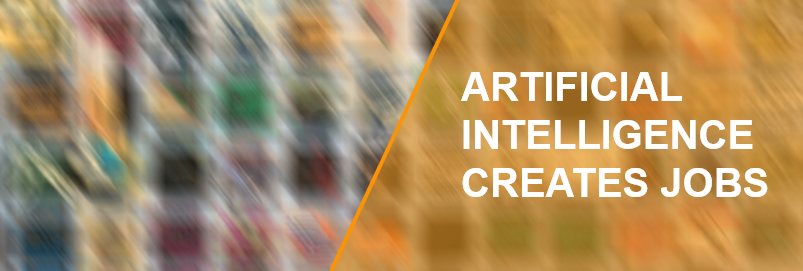
Despite its benefits, AI poses a threat to society. The following presentation explains the potential dangers of Artificial Intelligence for society.

AI is already here
A number of different forms of Artificial Intelligence have become available to us in our daily lives and at work.

AI is not about destroying jobs
Many people view AI technology as a threat to their jobs. But, it is an effective means of transforming and improving work efficiency and quality. It also prevents burn-out, enhancing well-being and economic growth due to transformation.

The theoretical model of AI
As rapidly as AI has caused changes, technological progress is still in its infancy. As a society, we do not understand where technology will lead us. As a result, innovators often oversell the potential impact of their creation. This includes delivery time, how many jobs it might destroy, and how it will transform entire societies and industries.

Media headlines focus on lost jobs
Whether AI will destroy jobs is still pure speculation. No industry has been destroyed by AI, but some are being transformed by it. However, history repeats itself, and the media often say it will happen soon – but it rarely does.

More jobs will be created
Current projections suggest that there will be no major job losses anytime soon. Instead, as a result of AI, new jobs will be created, jobs will be transformed, and some jobs might also be destroyed.

Examples of what we have accomplished so far using machine-learning algorithms:
•Voice and speech recognition: Communicating vocally with the system is possible. AI chatbots can have conversations with a user and keep human-like conversations, listen, and respond normally.
•Face and image recognition: Surveillance cameras and social media can analyze images and recognize faces and things.
•Photography and video: AI can create photos, images, and videos, enhance and manipulate and change them.

•Spot-on-diagnoses: The system can read X-rays, magnetic resonance imaging (MRI), mammograms, computed tomography (CT) scans, and ultrasound diagnostics.
•Track people and things: The system can track your location, where you have been, and present this data historically.
•Natural language processing: AI can read, analyze and understand text and provide a rational summary faster and more accurately than humans.
•Language translation: The system instantly translates text and voice.
•Write a summary or essay: AI can write essays on any topic.

•Voice recognition: AI can recognize and imitate your voice as if it were you speaking.
•Gesture technology: People can interact with the system through gestures.
•Software development: Artificial intelligence can significantly enhance Software testing and analysis.
•Make appointments: AI can also act upon requests, schedule appointments, and review agendas and calendars.
•Health monitoring: Smart wearable devices can measure and monitor health issues. And many more

We are not there yet!
AI uses Big Data and transforms it into information, spoken language, and logical summaries. In that case, AI does not provide intelligence factors such as solving problems, reasoning, or inventing things based on accumulated learning and experience.

Data quality and machine learning
There is also rubbish in and rubbish out. This is because the system utilizes structured and unstructured data from various sources. Poor data and AI algorithms can undermine social structure and democratic values, making it harder for people to thrive. Moreover, AI data can be mined from copyrighted material, such as books, music, and lyrics.

AI-Superintelligence
AI superintelligence is when a machine’s intelligence outperforms a human in every aspect, i.e., through humanoid robot innovation.

Next level of AI
Experts in Artificial Intelligence have differing opinions about when, how, and if Artificial Intelligence technology will surpass human capabilities.

What will it look like?
Experts project that superintelligence could be achieved in 2045. But we do not know when it will happen. It may take decades or centuries or never happen at all – no one knows.

AI poses a big threat to society
In human societies, big data and AI algorithm manipulation can destabilize social structure and democratic values. This makes it more difficult for people to thrive in society.
Protecting rights and society requires digital platforms to follow clear guidelines, rules, and legislation.

Avoid past mistakes
If AI technology advances too quickly ahead of guidelines, rules, and legislation for digital platforms, it might be too late to reverse course. The primary concern is that we do not take the road that develops a dysfunctional society that no one wants.

Manipulation of digital platforms
•Spread propaganda to escalate extremism and racism.
•Discrimination against particular people or races.
•Data is misused for hateful purposes.
•Generate fake news and create harmful content.
•Intensify polarization on social and political fronts.
•Digital platform manipulation and bullying on social media often fuel these new threats where civilian lives are at risk.
•AI can influence elections and voting.

People being misdirected
•People are not protected; there are different rules and legislations in physical life and digital platforms.
•AI will make decisions for us without our ability to judge righteousness or wrongness.
•No one has a comprehensive view of how third parties sell and use private and personal information.
•Burn-out and psychological issues are possible when technology and social media constantly bombard and irritate people with information.
•AI will change our perception of truth – deepfake, faces, voices, etc.
•Use old photographs and recordings to imitate dead people.

AI will transform education
Professors, educators, and teachers evaluate students’ written work, demonstrating their understanding and knowledge of the subject matter commonly written in essays, academic papers, and reports. Similar to how Excel works with numbers, AI can create accurate texts that can be used to generate essays and reports. Unfortunately, many teachers consider students who use Artificial Intelligence to compose essays and reports cheating rather than adapting to modern technology. Teaching practices and performance ratings must be revolutionized to assess student skills, knowledge, and understanding in the age of Artificial Intelligence.

Businesses influence consumers
•The rules are determined exclusively by those who own the digital platforms.
•Users give their identity to third-party companies.
•Businesses collect, buy and use consumer insight information to influence people and sell more stuff to consumers.
•Based on consumer insights, companies can change people’s behavior about goods and services.
•Inequality: The rich get richer. There could be fewer small and medium-sized businesses.
•Job applications are aided by Artificial Intelligence.

Data collection is everywhere
•Surveillance systems attempt to keep users unaware that they track them continuously. It applies to tracking social media, commerce, household equipment, TVs, cars, location, smart devices, and financials.
•Track people’s lives, who they are, where they have been, their behavior, best friends, interests, hobbies, opinions, and personal information.
•Sell financial information about you.
•Provide insight information to business and government agencies.
•Provide detailed information about yourself when applying for a job.

Government agencies
•Develop a tracking information system about everyone’s whereabouts, social interests, face recognition, behavior, and opinions. This information can be stored in an extensive database that can be retrieved anytime.
•Government surveillance strategies.
•Identify possible offender behaviors by evaluating people early.
•Gain popularity through AI-driven digital platforms.
•Protect industries and self-interest by allowing uncontrolled personal and private data collection.
•National security issues such as cyber-attacks could collapse the system.

Government agencies
•Develop a tracking information system about everyone’s whereabouts, social interests, face recognition, behavior, and opinions. This information can be stored in an extensive database that can be retrieved anytime.
•Government surveillance strategies.
•Identify possible offender behaviors by evaluating people early.
•Gain popularity through AI-driven digital platforms.
•Protect industries and self-interest by allowing uncontrolled personal and private data collection.
•National security issues such as cyber-attacks could collapse the system.

Government and military
•The act of espionage involves acquiring private, personal, and sensitive information from other markets.
•Manipulate the system to influence other human societies and undermine social structure and democratic values. This makes it more difficult for people to thrive in society.
•Affect the financial system in such a way that a financial crisis occurs.
•Use autonomous weapons like missiles, drones, and airplanes. AI can track people and places spot-on.
•Demolishing the backbone and first-mile internet infrastructure.
•Threats of espionage from space and space wars.
AI-Vision is to contribute to a better world by making remarkable things happen. AI will help humans improve output, accuracy, and speed and save time. Unfortunately, due to debates surrounding it, the media tends to portray it as a job threat rather than a solution. Therefore, we must assign rules and guidelines for digital platforms so that we don’t make the mistakes of the past and end up behind.
I hope this guide helps you understand the current situation of Artificial Intelligence.
Please share with everyone interested in Artificial Intelligence.

